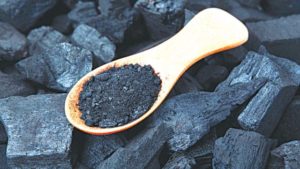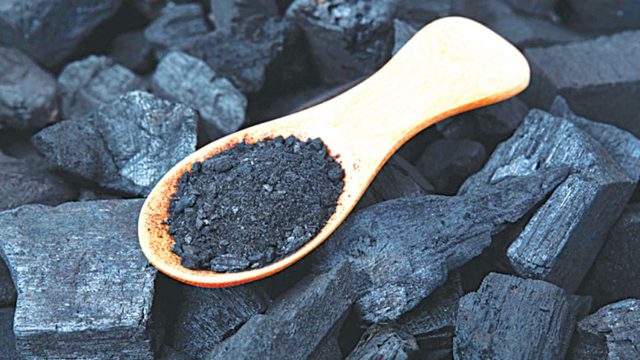
Charcoal as revealed by several studies can be used to treat skin ailments, diarrhoea, bad breath, constipation and body odour. It can be used as a poultice to treat insect stings, mushroom poisoning, poison ivy, cholera, dysentery, bites and inflammation.
It is locally used in Nigeria to make the teeth whiter, as antidote to poison, to prevent fermentation in grounded beans, among others. But scientists are now applying activated charcoal not in water purification but as antidote to adverse drug reaction from overdose as well as treatment of many disease conditions such as liver damage, bloating, skin infections, high cholesterol, diarrhoea, flatulence, indigestion, and hangovers.
Until now, activated charcoal was documented for use in treating medical conditions. It has been used by North American Indians to treat bruises, inflammation and skin infections. Activated charcoal has also been reported to help lower cholesterol, triglycerides and lipids found in the blood.
According to Natural News, single teaspoon of activated charcoal has a surface area of approximately 10 000 square feet. It adsorbs (binds to and helps eliminate from the body) poisons, heavy metals, chemicals and intestinal gases that have thousands of times more weight than it has, making it very effective in detoxing and eliminating toxins and poisonous substances from the body. It is also able to adsorb many different pharmaceutical drugs, opium, cocaine, morphine, pesticides, chemicals, mercury and even lead.
Several studies have shown that activated charcoal can be used to treat skin ailments, diarrhoea, bad breath, constipation and body odour. It can be used as a poultice to treat insect stings, mushroom poisoning, poison ivy, cholera, dysentery, bites and inflammation. It can also be used to treat snakebites in an emergency. Babies born with jaundice have been reportedly treated with activated charcoal as well.
Activated charcoal is available in many different forms such as powder in a capsule, liquid form, suspension, chewable tablets and powder form. It is often used as an ingredient in body detox products and colon cleansers. Some people report that using activated charcoal when they have flu or other viruses helps them to recover quicker. The reason for this is that it is able to prevent viruses and bacteria from remaining active in the body while absorbing a great deal of their toxins before they have a chance to spread or multiply.
Studies have shown that activated charcoal even has anti-ageing properties. It helps improve liver, adrenal gland and kidney functions with regular use. Those suffering from digestive ailments such as indigestion, bloating or gas can benefit from activated charcoal because the charcoal enters the digestive tract and absorbs excess gas, which may be present there. It also improves the functioning of the liver, heart and brain and helps to decrease cholesterol levels and the risk of coronary artery disease. Naturopaths recommend that when using activated charcoal, it is best to take it between meals and a few hours after using any vitamin or mineral supplements, as it may interfere with the absorption of these into the body. It must also be stored in a properly sealed container away from heat and moisture. It should preferably be used with water only, or taken alone, as anything else such as fruit juice or ice cream will cause it to lose a great deal of its effectiveness.
Also, studies have shown that in large doses, activated charcoal may cause stools to turn black. This is normal. In large doses, it may also lead to diarrhoea, nausea or vomiting. Those suffering from obstruction of the bowel should not use this product.
According to the Natural Standard Bottom Line Monograph, itchy skin may be caused by advanced chronic kidney failure and dialysis. Research suggests that activated charcoal may benefit people with this condition. The reasons for this benefit are not well understood. However, experts suggest that activated charcoal may adsorb a compound that causes the itching.
Studies suggest that high levels of bile acids may lead to bile flow problems in pregnancy. Early evidence shows that activated charcoal may be effective in preventing this condition.
Anticancer drugs have been found to be unsuccessful in reducing secondary cancer development in people who have had stomach cancer surgery. Early research suggests that chemotherapy with mitomycin C adsorbed onto activated charcoal (MMC-CH) may help increase survival rates after stomach cancer surgery.
Some studies suggest that activated charcoal may adsorb gas. However, results are inconsistent. Early research reports that activated charcoal may lower cholesterol levels. Early research suggests that activated charcoal plus simethicone (with or without magnesium oxide) may reduce indigestion symptoms. More research is needed on the potential effects of activated charcoal alone. Research shows that activated charcoal may help reduce nitrogen-containing waste products. A low-protein diet combined with activated charcoal has been found to benefit elderly people who have advanced kidney disease.
Nigerian researchers from University of Agriculture Abeokuta, Ogun State, have reported that activated charcoal is an adsorbent widely used in the treatment of wastewater and industrial contaminants by virtue of its high removal capacity and adaptability for a wide range of pollutants.
The researchers in a study published in Enzyme Research noted that activated charcoal is made from any essentially carbonaceous materials. Tree bark, coal, cotton waste, palm kernel shell, and many agricultural by- products can be used to produce activated carbon and their ability to remove colours have been reported.
According to the researchers, activated charcoal is used to remove compounds that cause objectionable taste, colour, and odour in water treatment while its industrial applications involve removal of toxic gases and pesticides and as well as purification of organic compounds. It is known that around 80 per cent of the world production of activated charcoal is used in aqueous-phase adsorption of both organic and inorganic compounds. The researchers also demonstrated the application of activated charcoal in the decolorization of enzyme-converted glucose syrup and in the purification of microbial enzymes.
According to Wikipedia, while charcoal has been used since ancient times for poisonings, activated charcoal has been used since the 1900s. It is on the World Health Organization’s List of Essential Medicines, the most effective and safe medicines needed in a health system.
Charcoal biscuits were sold in England starting in the early 19th century, originally as remedy to flatulence and stomach trouble. Tablets or capsules of activated carbon are used in many countries as an over-the-counter drug to treat diarrhoea, indigestion, and flatulence. There is some evidence of its effectiveness to prevent diarrhoea in cancer patients who have received irinotecan. It can interfere with the absorption of some medications, and lead to unreliable readings in medical tests such as the guaiac card test.
Activated carbon is also used for bowel preparation by reducing intestinal gas content before abdominal radiography to visualize bile and pancreatic and renal stones. A type of charcoal biscuit has also been marketed as a pet care product.





